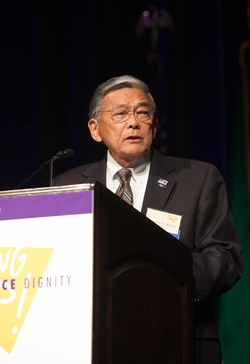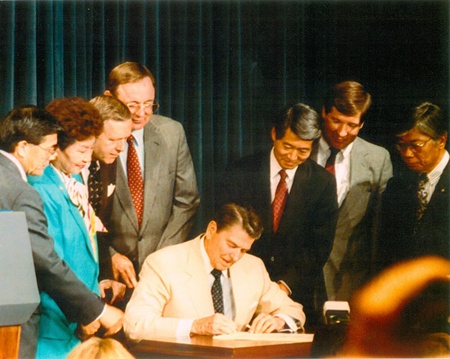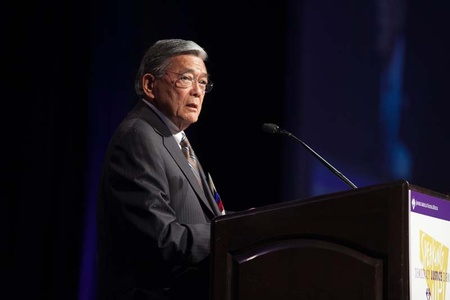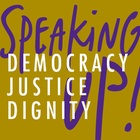You know, this evening I was originally supposed to speak here tonight in a conversation with Senator Daniel K. Inouye. But as all of us know, our community and our nation suffered a very great loss with his passing and that loss is definitely felt tonight.
Of all the stories that I’ve ever heard or could tell about our great friend, Senator Dan Inouye, there is one that will always stand out in my mind. In the darkest days of World War Two, when he gained the right to be able to serve his country, Dan headed off to basic training and eventually to the battlefields of Europe. But before he left home, his father told him do not bring dishonor to the family. With all due respect to the Senior Mr. Inouye, he need not have worried about that, but in fairness to him I don’t think even Mr. Inouye could have imagined how much honor his son would bring to this great country.
The world is a different place than it might have been had Senator Dan Inouye not been in it. There’s a world into which we are born and then there is a world that we are leaving. While the differences that Senator Dan Inouye made are extraordinary, even more extraordinary is the generosity he showed in allowing the Japanese American community to claim his contributions to this great country as in some sense ours. He is no longer with us but our pride in him still is. And the question we have to answer is: what do we do with that pride? What do we do with his story? For that matter, what do we do with all the stories of those of us of Japanese ancestry and the things we experienced during one of the most traumatic periods in our nation’s history?
Those are Japanese American stories to be sure, but by definition that means they are also American stories as well. And as very proud members of the American family, we have a standard of honor to live up to and every single one of us knows who set that standard. The Japanese American National Museum stands as a testament and a reminder of all the things we have experienced. Now this year, we celebrate the 25th anniversary of the signing of the Civil Liberties Act of 1988 on August 10, 1988, by President Ronald Reagan. Many might assume that having won that apology for the injustices that we suffered, that we would fade away, that our work was done. But we did not settle for simply talking about what happened. The Japanese American National Museum is not an expression of our grievance; it is the custodian of our legacy. We insist on turning what happened to us into something good not just for ourselves, but for all Americans.
And as it turns out, that’s actually working. Now none of us will ever forget the terrorist attacks of September 11, 2001. And I know I have talked about this before, but as the then sitting United States Secretary of Transportation at the time, it was one of the most harrowing days of my life. It was being, quite rightly, compared to Pearl Harbor, which meant that as an American of Japanese ancestry, I had an extra fearful question to consider: What is this going to mean for Arab Americans?
It was just a few days later that President Bush responded in part by speaking at a large gathering of Arab Americans and Muslims at the Islamic Studies Center in Washington D.C. and declaring that the United States’ war was not with loyal Arab Americans, or faithful followers of the Muslim faith but with terrorists and extremists who had hijacked a faith no less than they had hijacked those airplanes. Now he was my boss at the time and I make it a point not to talk about the advice I give people for whom I work, but the most important thing for you to know is this: I didn’t have to ask him to do that; he came up with that idea on his own. But he would tell you as well that he didn’t come up with the idea entirely on his own. He had the same fear that I had because we had told our fellow Americans, including him, our story. If ever we needed a reminder of the importance of remembrance, it would be that.
Now last week I got a call from a former staffer of mine and he called to thank me, and frankly to thank all of us. You see, he’s gay and last week the United States Supreme Court ruled that the federal government must respect his right to get married. They did that on the basis of the principles of equal protection and due process. And although it is not directly cited, all of the legal reasoning they used can be traced directly to their decision in Korematsu vs. United States. The Japanese American Citizens League reached that decision about his equal worth and dignity as an individual nineteen years ago, and this former staff person of mine reminded me that the JACL was the first racially or ethnically based civil rights organization to do so. And then he said this, and I quote, “You know when I was 12 years old and figured out that I’m gay, I then found out that being me was a criminal offense punishable by five years in jail. I guess it shouldn’t surprise me that if any group of people would understand what it’s like to find out as a kid that your own government considers you to be illegal, it would be the Japanese American community. And I’m sorry that it did surprise me, but you see we grow up not even being able to take our own parents for granted. Friends who show up like magic out of nowhere to stick up for us. That never gets forgotten.” End of quote.
Now last week the first person in American history to receive permanent residency status as a same-sex spouse got her green card. She and her wife who are residents of Colorado and were married in Iowa are raising three daughters including one with special needs, and now they know they’re home. Even as we meet here in Seattle, the long-standing question of immigration reform is under debate in the other Washington.
The central question in that debate is one in which our community has a powerful voice. Who is an American and who is not? Should a child who knows and loves no other country than this one be told that simply because of how their country feels about his or her parents, this country is no longer his or hers? Who better to answer that question than us? On December 7, 1941, I saw my father cry for the first time because he could not understand why the land of his birth had now attacked the land of his heart. And what happened next happened because people in power saw only the population group to which he belonged and not about what was in his heart. And that is a mistake that unfortunately was not something that happened once and never again.
Failing to treat people on the basis of their own merits is a constant human failing, which means it’s going to keep happening. And those of us who know the consequences of that must remain ever vigilant. Not vigilantes, but be vigilant in the protection of our constitutional rights. For ourselves to be sure, but also for the integrity of the communities in the nation of which we are a part. It isn’t about, despite what some people say, playing victim or not letting the past be the past.
Congresswoman Patsy Mink once said this, and I quote, “What you endure is who you are, and if you just accept and do nothing, well, life goes on. But if you see it, it is a way for change. Life doesn’t have to be this unfair; it can be better. Maybe not for me, I can’t change the past but I can certainly work so somebody else in the future doesn’t have to go through what I did.” End of quote.
And the really important thing here is that Patsy Mink, one of the greatest of our Japanese American heroes, wasn’t talking about the Nikkei incarceration at all. She was talking about the fact that she had been denied entrance to medical school because she was a woman. So she became a lawyer and a member the United States Congress and fixed that with her authorship of Title IX, which is now named after her. Now the year before Patsy passed away was the first year in American history where the majority of first-year law students and first-year medical students were women. And I will be eternally grateful that she lived to see that, and so will my granddaughters.
The Japanese American National Museum is not our community’s complaint. It is a part of the American story to which we have been given custody, even though we didn’t want it and certainly didn’t ask for it, but it is now, and it will always be our job to make sure that the lessons of the past are never forgotten. We are not mired in the past; we are invested in the future, which is a tough assignment. But we’re Americans and Americans always get the job done, especially when we know our neighbors need our help and when we have Senator Daniel K. Inouye to live up to. So god bless each and every one of you and may God continue to bless the United States of America. Thank you very much.
*The Honorable Norman Y. Mineta was the keynote speaker at the Dinner Banquet during JANM’s National Conference, Speaking Up! Democracy, Justice, Dignity in Seattle, Washington.
Watch the keynote address by the Honorable Norman Mineta >>
© 2013 Norman Mineta







